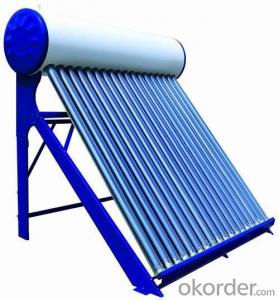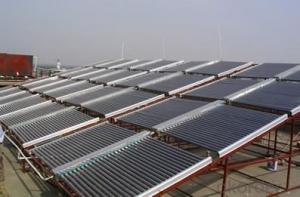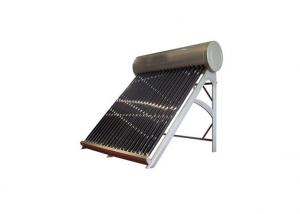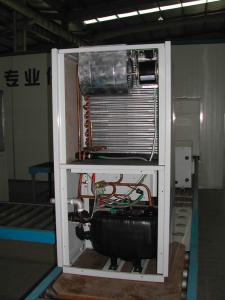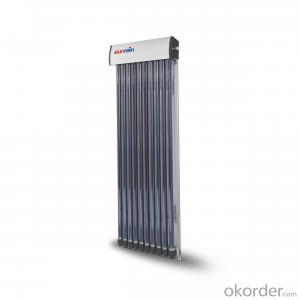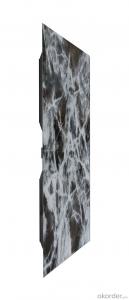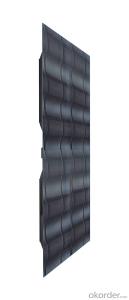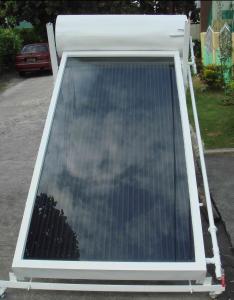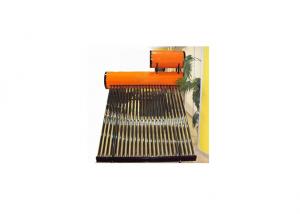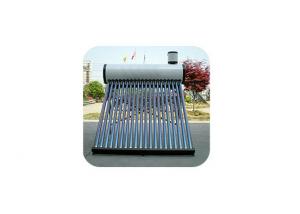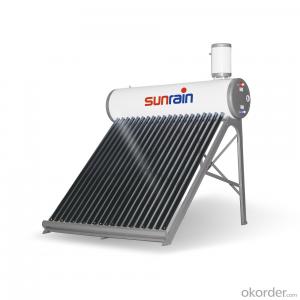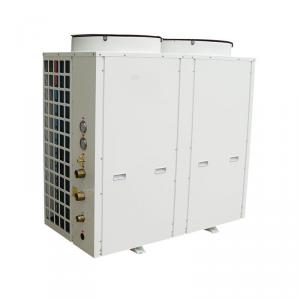Solar Heater for Household with 2.0mm thickness aluminum
- Loading Port:
- China main port
- Payment Terms:
- TT OR LC
- Min Order Qty:
- 10 set
- Supply Capability:
- 10000 set/month
OKorder Service Pledge
OKorder Financial Service
You Might Also Like
Solar water heaters features
1. The upright tank can make the water temperature to a high level. It can hot the water instantly
2. The tank inside the building, the hot water loses less energy than the normal one
3. The solar collector and the tank of solar water heater is separated, that makes the system combine with the building perfectly, which will reduce the sightseeing for the building and environment around
4. Back up with electric heater so that in the day without sunshine hot water can also be used
5. Can be combined with gas or electric heater
6. Max. Pressure: 12bar; Operating Pressure: 6 bar
7. It can be used for other function, such as warming
Solar water heaters working principle
1. The solar collector absorbs solar energy and transmits it to the solar water heater tank through circulation
2. When the temperature of the collector reaches the set value, the controller starts the circulation pump automatically
3. The circulation pump makes heat-conducting liquid circulate automatically
4. The heat-conducting liquid transfers heat to water by lower heat exchanger in the water tank.
5. When the temperature difference between solar collector and heat pipe solar water heaters tank doesn't reach the set value, the circulation pump will be shut automatically
6. In case the temperature of the water tank does not reach Tmax, Electric Heating Element will start to work automatically
Solar water heaters working station component:
1. Operating screen
2. Manometer
3. Pump speed adjust switches
4. Temperature difference circulation pump
5. Flow rate indicator
6. Return circuit connector
7. Safety valve
8. Expansion vessel connector9. Return circuit connector
10. Wall mounting
11. Expansion vessel:8L
12. Pressure resistance: 10 bar pressure for expansion vessel
Solar water heaters specification:
Description | solar water heaters |
Material of out manifold | 0.55mm thickness color steel/ fluorine carbon steel |
Material of inner tank | Food grade 2.0 mm thickness SUS304 stainless steel |
Tank insulating layer | 40mm 45kg/m³ high-density polyurethane foamed |
Inlet and outlet hole | Male G1'' |
Max pressure | 0.6 Mpa |
Solar collector tube | 3.3 Borosilicate glass with N/Al coating |
Thickness of glass tube | 1.6mm |
Vacuum tube tightness | P≤0.005 Pa |
Absorption | as=0.93-0.96 (AM1.5) |
Emission ratio | εh=0.04-0.06 (80C±5C) |
Idle sunning property parameters | Y=220~260m2.C/KW |
Average heat loss coefficient | ULT=0.6~0.7W/(m2.C) |
Bracket: | 2.0mm thickness aluminum alloy |
Tank weight | 75KGS |
Tank size | 560mm Dia x 1810mm Height |
Tank capacity | 300L |
Solar collector | 2pcs 58x1800x15tube solar collector |
Absorber area | 2.811 m² |
Working station | SP116 working station |
Heat exchanger length | Upper:12m, Underside:18m |
Solar water heaters details show:
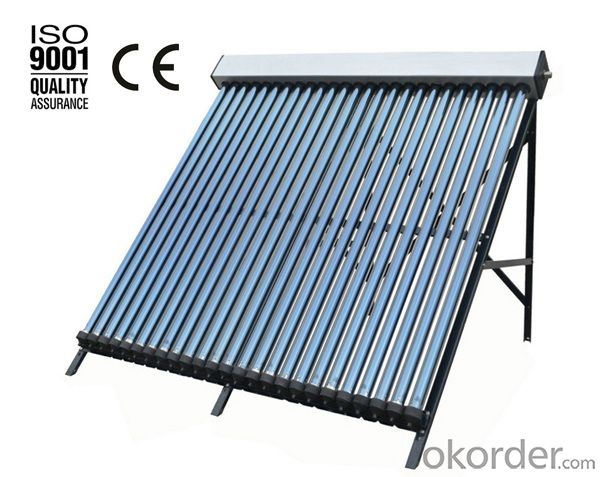
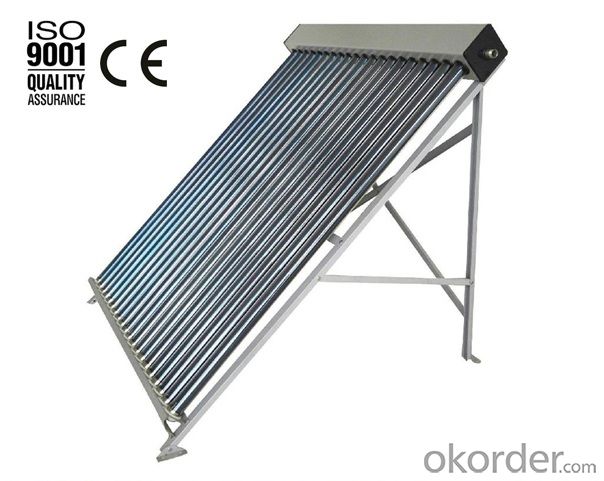
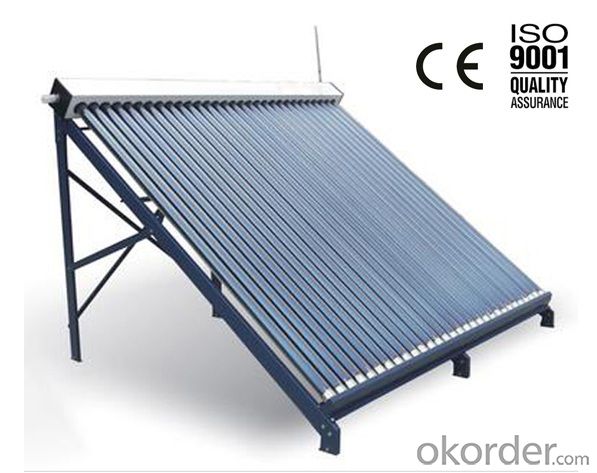
Benefits of this kind of solar water heaters:
1. Prolong the life of your existing water heater
2.Costs less than an electric, gas or oil water heater
3.No maintenance required
4.Lasts longer than a traditional hot water heater
5.Reduce your water heating costs
- Q:Can a solar water heater be used in areas with high winds?
- Yes, a solar water heater can be used in areas with high winds. However, it is important to consider the design and installation of the system to ensure it can withstand the wind forces. Reinforcements and proper anchoring can be implemented to ensure the stability and functionality of the solar water heater in such conditions. Additionally, selecting a suitable location with minimal wind exposure can also help optimize its performance.
- Q:What certifications or standards should a solar water heater meet?
- To ensure efficiency, safety, and compliance with industry regulations, a solar water heater must adhere to specific certifications and standards. Below are some significant certifications and standards that a solar water heater should satisfy: 1. The Solar Rating and Certification Corporation (SRCC): SRCC is a well-known certification organization that evaluates and rates the performance of solar energy systems, including solar water heaters. Their certification guarantees that the system meets precise performance and durability criteria. 2. The International Organization for Standardization (ISO): ISO has numerous applicable standards for solar water heaters. ISO 9459-2 provides guidelines for testing and calculating the thermal performance of solar water heaters, while ISO 9806 covers the testing and rating of solar thermal collectors. 3. The European Solar Keymark: This certification is exclusive to the European Union and serves as a mark of quality and compliance with European standards for solar thermal products. It ensures that the solar water heater meets the necessary performance and safety standards. 4. National or regional building codes: Solar water heaters must comply with the specific building codes of the region where they are installed. These codes outline particular requirements for the design, installation, and safety aspects of solar water heating systems. 5. Safety certifications: Solar water heaters should meet safety certifications like the Underwriters Laboratories (UL) certification in the United States or the TUV certification in Europe. These certifications guarantee that the product has undergone thorough testing to ensure its safety and proper functioning. 6. Energy Star: Although primarily associated with energy-efficient appliances, the Energy Star program also covers solar water heaters. The Energy Star label indicates that the product meets certain energy efficiency criteria, enabling consumers to identify the most energy-efficient options. By fulfilling these certifications and standards, a solar water heater demonstrates its quality, performance, and compliance with industry regulations. This, in turn, instills confidence in consumers regarding its reliability and efficiency.
- Q:Can a solar water heater be used in areas with limited biomass availability?
- Yes, a solar water heater can be used in areas with limited biomass availability. Solar water heaters are powered by the sun's energy, which is a renewable and abundant source of power in most regions. Unlike biomass-based water heaters, solar water heaters do not require the burning of biomass fuels for heating water, making them a sustainable and viable option in areas where biomass availability is limited.
- Q:What is the expected lifespan of the control system in a solar water heater?
- The expected lifespan of a control system in a solar water heater can vary depending on various factors such as the quality of the system, regular maintenance, and environmental conditions. However, on average, a well-maintained control system can last for around 10-15 years.
- Q:How long does it take for a solar water heater to heat up water?
- The time it takes for a solar water heater to heat up water can vary depending on several factors such as the size of the system, the amount of sunlight available, and the initial temperature of the water. Generally, it can take anywhere from a few hours to a full day for a solar water heater to heat up water to the desired temperature.
- Q:Can a solar water heater be integrated with other renewable energy systems?
- Yes, a solar water heater can be integrated with other renewable energy systems. This integration allows for a comprehensive and efficient approach to meeting the energy needs of a building or household. For example, a solar water heater can be connected to a solar photovoltaic (PV) system to provide electricity for powering the water heater's pump or other auxiliary systems. This way, excess electricity generated by the PV system can be utilized to heat water, reducing the reliance on traditional grid electricity. Furthermore, a solar water heater can also be integrated with other renewable energy sources such as wind or geothermal. In areas where wind energy is abundant, a wind turbine can be connected to the same grid as the solar water heater, enabling the utilization of wind power to supplement solar energy for heating water. Similarly, in regions with geothermal resources, a geothermal heat pump can be utilized alongside the solar water heater to provide heating and cooling for the water, maximizing energy efficiency. The integration of different renewable energy systems allows for a more sustainable and resilient energy solution. By utilizing multiple sources of renewable energy, the overall energy generation and consumption can be optimized, reducing dependence on fossil fuels and minimizing environmental impact. Additionally, the combination of different renewable energy technologies can provide a more consistent and reliable energy supply, as the availability of one resource may compensate for the variability of another. Overall, integrating a solar water heater with other renewable energy systems is a viable and advantageous approach to maximizing energy efficiency and sustainability. It allows for the utilization of multiple renewable resources, reducing reliance on traditional energy sources, and contributing to a greener and more resilient energy future.
- Q:Can a solar water heater be used in areas with high levels of air pollution from chemical plants?
- Yes, a solar water heater can still be used in areas with high levels of air pollution from chemical plants. However, the efficiency of the solar water heater may be affected due to reduced sunlight reaching the solar panels. Regular maintenance and cleaning of the panels may also be required to prevent the accumulation of pollutants that could further decrease efficiency.
- Q:How does a solar water heater perform during cloudy days?
- Cloudy days have a significant impact on the performance of a solar water heater. Sunlight is essential for generating heat, which warms the water in these heaters. Consequently, when clouds obscure the sun, the heat transferred to the water decreases, resulting in a decline in performance. However, it is crucial to note that solar water heaters can still function and supply hot water on cloudy days, albeit with lower efficiency. Most of these heaters are equipped with backup systems, such as electric or gas heating elements, which can be activated when there is insufficient sunlight. This ensures a continuous supply of hot water even in unfavorable weather conditions. Furthermore, advancements in technology have led to the development of more efficient solar water heaters that can still capture some solar energy even in overcast conditions. These systems utilize special coatings on solar panels or evacuated tubes to maximize heat absorption and minimize heat loss. As a result, they perform better during cloudy days compared to older models. In conclusion, although the performance of a solar water heater is diminished on cloudy days due to reduced sunlight, it is designed to provide hot water through backup systems and by utilizing any available solar energy. The efficiency of the system during cloudy days can vary depending on the design and technology employed, but newer models are more effective at capturing solar energy even in overcast conditions.
- Q:How much does a solar water heater cost?
- The cost of a solar water heater can vary depending on factors such as its size, type, quality, and installation requirements. On average, a basic solar water heater system can cost anywhere from $2,000 to $5,000, while more advanced or larger systems can range from $5,000 to $10,000 or more. It's important to consider the long-term savings on energy bills and potential tax incentives when evaluating the overall cost-effectiveness of installing a solar water heater.
- Q:How does a solar water heater reduce carbon emissions?
- A solar water heater reduces carbon emissions by using the sun's energy to heat water instead of relying on fossil fuels like natural gas or coal. This renewable energy source reduces the need for conventional heating methods, which produce greenhouse gas emissions during the combustion process.
1. Manufacturer Overview |
|
|---|---|
| Location | |
| Year Established | |
| Annual Output Value | |
| Main Markets | |
| Company Certifications | |
2. Manufacturer Certificates |
|
|---|---|
| a) Certification Name | |
| Range | |
| Reference | |
| Validity Period | |
3. Manufacturer Capability |
|
|---|---|
| a)Trade Capacity | |
| Nearest Port | |
| Export Percentage | |
| No.of Employees in Trade Department | |
| Language Spoken: | |
| b)Factory Information | |
| Factory Size: | |
| No. of Production Lines | |
| Contract Manufacturing | |
| Product Price Range | |
Send your message to us
Solar Heater for Household with 2.0mm thickness aluminum
- Loading Port:
- China main port
- Payment Terms:
- TT OR LC
- Min Order Qty:
- 10 set
- Supply Capability:
- 10000 set/month
OKorder Service Pledge
OKorder Financial Service
Similar products
New products
Hot products
Related keywords
